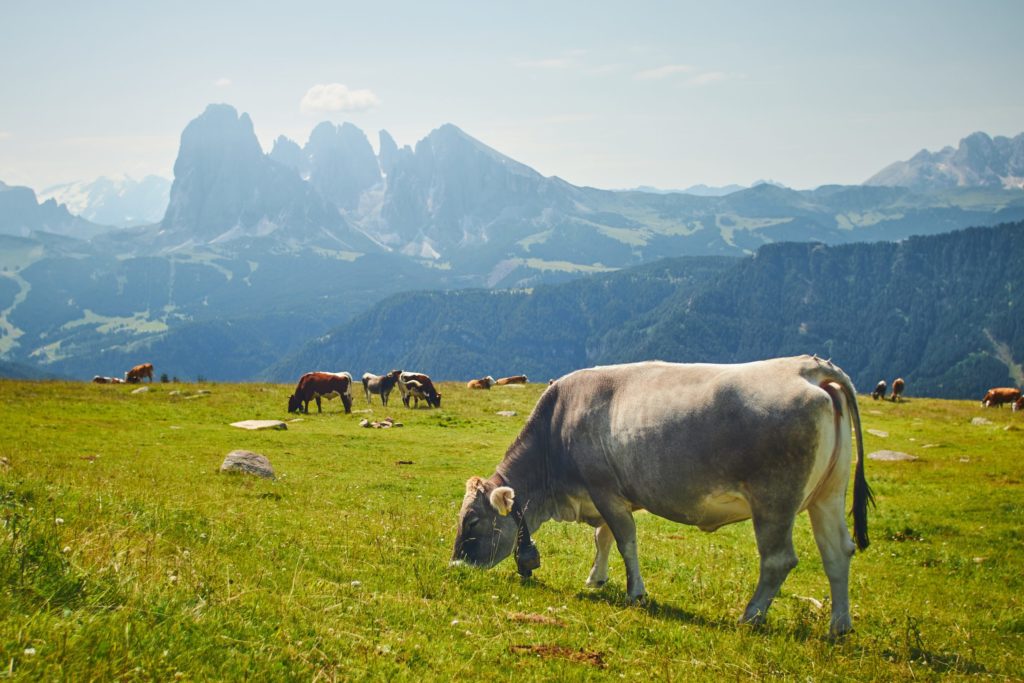Our website is called Cowhides Patagonia for a reason. These are our products, and this is where we do our business.
So how are the cows doing in the region? How are they cared for? And finally — how can you be sure that you will get a cowhide from a healthy cow, making an ethical and morally justified purchase?
Where is Patagonia Even Located?
Patagonia is the name commonly used to refer to the region of southern South America in which this brand of cowhides comes from.
The Argentinian city of Bariloche, for example, was originally named Buenos Aires City in Argentina. Historically, Argentina and Chile have been big competitors — and now they’re one big country again. But that has not changed the fact that when entering this region you will be entering two different countries: Argentina and Chile.
Cattle’s Daily Life in The Mountains
The cows in Patagonia are being fed with a mixture of grain – at least one third of which is grown there – and what they eat is a varied diet that includes grasses.
The quality of their food is high, especially so because they can graze freely in the wilds of Patagonia’s forests. The local farmers have tried to create a stable cattle population by organizing the region’s cattle ranches into cooperatives which coordinate the sale of meat and hides.
Is Patagonia the Farmland Paradise?
The majority of Patagonian farmers live in rural areas and some have been involved in agricultural activities for several generations.
The region’s farmers, local as well as immigrants from other parts of Chile, follow the traditional ways of raising cows.
They often do this by leaving their cattle outside during the warmer months and bringing them into stables when it starts to get too cold. They also leave the calves with their mothers for at least a year, knowing that only after that period will they give birth again, thus increasing the size of the herd.
The cows are well cared for and don’t have to worry about anything else other than growing and giving milk.
The Best Things About the Cattle Industry in Patagonia
The industry’s positive aspects that make us want to do business with them are:
Long-Term Relationships
The families don’t just trade skins and meat, but they also depend on each other. In many cases, the farmer who has some cows keeps them for at least a few years before selling them to another farmer or to the company themselves.
Reliable Sales
When it comes to selling their cattle, farmers have a very good idea of what they can expect and this is the best proof that their animals are healthy and well cared for.
Growing Business
Due to Patagonia’s stable natural environment, the cow population is growing. There are more and more skins available and this creates a steady demand.
Good Opportunities
Another good reason for being involved in the region’s cattle industry is that there are still a lot of open spaces where you can create new farms or expand your business, which makes for a dynamic market with big opportunities for all entrepreneurs out there.
High Quality Hides
In addition to supplying cows to the industry, farmers themselves make good use of hides by using them to produce clothing, handbags and other accessories that they sell at home and abroad.
Our Final Word
As a company that is making an effort to do business in a sustainable way, doing so in a region like this one is just not possible without having some good reasons.
The biggest advantage of being there is that it will give you real access to some of the best cows. They are awesome animals that live in the wilds of Patagonia’s forest and consume only grasses.
Because of the traditional approach of the local farmers, we know that cows are not abused: they’re treated like family until the time comes. We know it never comes because the cow hides alone, and mostly because of the meat that farmers would need anyway, so we do business with a light heart.
